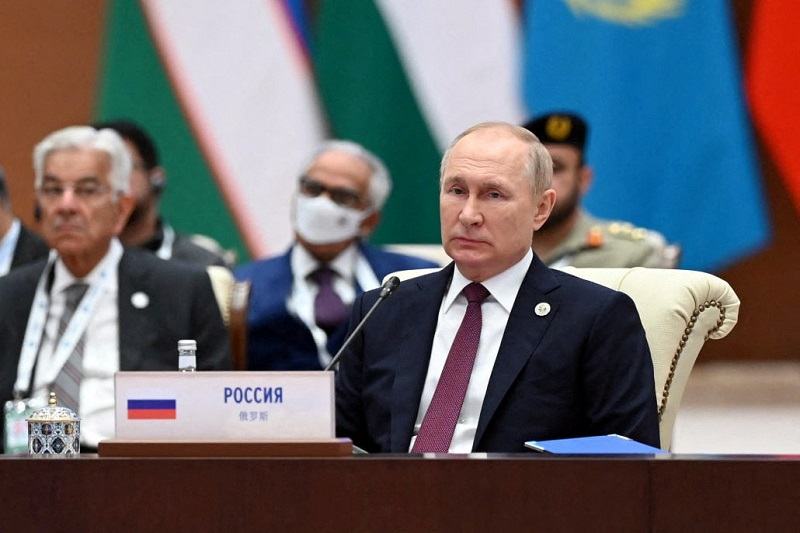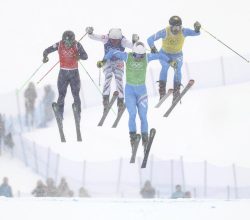
Russian President Vladimir Putin attends a meeting of heads of the Shanghai Cooperation Organization member states at a summit in Samarkand on Friday.
13:20 JST, September 17, 2022
Challenged bluntly and publicly by Indian Prime Minister Narendra Modi over the war in Ukraine, Russian President Vladimir Putin said Friday that Russia would strive to stop the conflict “as soon as possible.” But then he accused Ukraine of refusing to negotiate, although Putin ordered the invasion and his troops are still occupying a large swath of Ukrainian territory.
Putin made the remarks during an appearance with Modi in Samarkand, Uzbekistan, where they are attending a meeting of the Shanghai Cooperation Organization.
In a stunning public rebuke, Modi told Putin: “Today’s era is not an era of war, and I have spoken to you on the phone about this.”
The rare reproach showed the 69-year-old Russian strongman coming under extraordinary pressure from all sides. Internationally, he is facing calls to end the war not only from his traditional critics in the West, but also from Asian partners whom he cannot paint as beholden to the U.S. And at home, where he has cracked down on antiwar dissenters, he is being hammered by right-wing hawks who are infuriated over Russia’s military stumbles and are calling for a national draft.
Modi’s remark, as the two leaders sat in front of journalists and cameras, came a day after Putin acknowledged he had heard “concerns and questions” about the war from Chinese President Xi Jinping at the same conference. Xi, however, did not voice his questions or concerns publicly.
Responding to Modi, Putin said: “I know your position on the conflict in Ukraine, about your concerns that you constantly express. We will do our best to stop this as soon as possible. Only, unfortunately, the opposing side, the leadership of Ukraine, announced its abandonment of the negotiation process, declared that it wants to achieve its goals by military means, as they say, ‘on the battlefield.’ Nevertheless, we will always keep you informed of what is happening there.”
Russia has been hit hard by Western sanctions over the war and has been relying on continued trade with India and China, including sales of oil and natural gas, as a financial lifeline.
The questions and criticism from Xi and Modi follow a week where Russia has suffered steep military setbacks. A Ukrainian counteroffensive pushed Russian troops out of the northeastern Kharkiv region. And Kyiv is pressing forward, calling on allies to supply additional weapons in hopes of tipping the war decisively in its favor.
The Russian military has responded by targeting civilian infrastructure, including the power grid in the Kharkiv region, leaving dozens of settlements without electricity and running water. Putin called these attacks “a warning.”
“If the situation continues to develop in this way, the answer will be more serious,” Putin threatened in comments made to Russian reporters later Friday.
The Russian leader also reiterated his accusation that Kyiv has rejected negotiations.
“They are refusing! The first condition is that they agree. But they don’t want to,” he said.
Ukrainian President Volodymyr Zelensky stated Saturday that peace talks are “impossible” at the moment. “We want to end the war, but the space and opportunities have changed. Society does not want to talk to terrorists,” he said.
Russia and Ukraine held several rounds of peace negotiations in April but the effort fizzled after the two sides couldn’t agree on conditions for the deal and Ukraine, shocked by the horrific images emerging from formerly occupied towns such as Bucha, accused Russian troops of carrying out war crimes.
Putin launched the full-scale invasion of Ukraine in February, and his troops initially tried to seize Kyiv, the capital, with the intent of toppling Zelensky’s government. That failed, as Ukrainian forces pushed the Russians into a messy retreat.
Russia has suffered tens of thousands of casualties, and the war increasingly looks unwinnable. Many analysts say that despite Ukraine’s recent gains, the fighting could go on for months, if not years.
Russia and India for years have enjoyed close bilateral cooperation, but, as with China, Putin’s decision to invade Ukraine has tested the relationship.
On Friday, Moscow suffered additional setbacks as it continued to lose its military footing in eastern and southeastern Ukraine. At least five pro-Russian officials working in occupied Ukrainian territories died as a result of explosions and strikes, which Moscow blamed on Kyiv.
In the southern port city of Kherson, which Russia seized in the first days of the invasion, several U.S.-made HIMARS rockets razed a wing of the city administration’s building, which was being used by occupying authorities. The strike killed at least one person and wounded others, according to Kirill Stremousov, the Russian-installed deputy head of the region.
To the east, in the self-declared, separatist Luhansk People’s Republic, the prosecutor general Sergei Gorenko and his deputy Yekaterina Steglenko were killed in an explosion at their offices, according to Russian state media.
And in the southeastern city of Berdyansk, Oleh Boyko, deputy head of the city’s occupation authorities, was killed alongside his wife Lyudmila, who led the local election commission involved in staging a referendum – one of the sham votes that Russia had intended to use as a precursor to annexing Ukrainian territory.
Ukraine so far has not claimed responsibility for any of those attacks.
Ukrainian presidential adviser Mykhailo Podolyak tweeted that the attacks “should be viewed as showdowns of local organized criminal groups that could not share looted property before a large-scale escape. Or as [Russia’s] purge of witnesses to war crimes.”
The deaths further alarmed pro-war hawks in Moscow who have been increasingly critical of the Kremlin’s strategy in Ukraine and of the Russian military’s front-line failures. They are now calling for general mobilization, a measure that would almost certainly cause widespread public backlash.
Chechen leader Ramzan Kadyrov, a staunch ally of Putin whose three wives and daughters were recently sanctioned by the U.S., called on each of the 85 Russian regions to “self-mobilize” and recruit a “minimum” of 1,000 soldiers.
“There is no need to wait for the Kremlin to declare martial law or sit back waiting for the end of the special military operation in Ukraine,” Kadyrov wrote in his Telegram blog.
At least eight regional leaders have backed the proposal so far. Roman Starovoit, governor of the Kursk region which borders Ukraine, said on his Telegram channel that he has so far sent more than 800 volunteers to Ukraine, and that more are being recruited “to protect the regional borders.”
Sergei Aksyonov, the Moscow-appointed leader of annexed Crimea, said that the region has already sent 1,200 fighters and is working to form two more battalions.
Top Articles in News Services
-

Survey Shows False Election Info Perceived as True
-

Prudential Life Expected to Face Inspection over Fraud
-

Hong Kong Ex-Publisher Jimmy Lai’s Sentence Raises International Outcry as China Defends It
-

Japan’s Nikkei Stock Average Touches 58,000 as Yen, Jgbs Rally on Election Fallout (UPDATE 1)
-

Japan’s Nikkei Stock Average Falls as US-Iran Tensions Unsettle Investors (UPDATE 1)
JN ACCESS RANKING
-

Japan PM Takaichi’s Cabinet Resigns en Masse
-

Japan Institute to Use Domestic Commercial Optical Lattice Clock to Set Japan Standard Time
-

Israeli Ambassador to Japan Speaks about Japan’s Role in the Reconstruction of Gaza
-

Man Infected with Measles Reportedly Dined at Restaurant in Tokyo Station
-

Videos Plagiarized, Reposted with False Subtitles Claiming ‘Ryukyu Belongs to China’; Anti-China False Information Also Posted in Japan
























